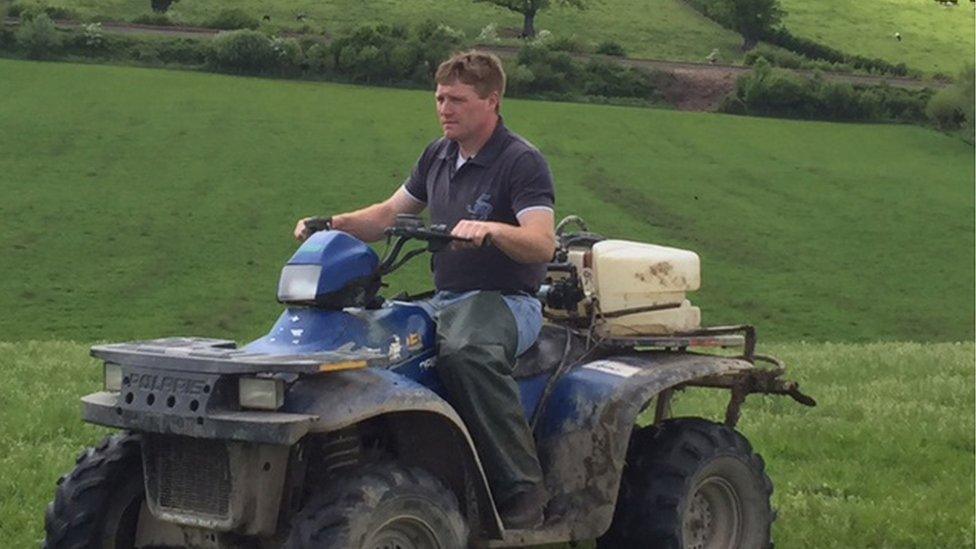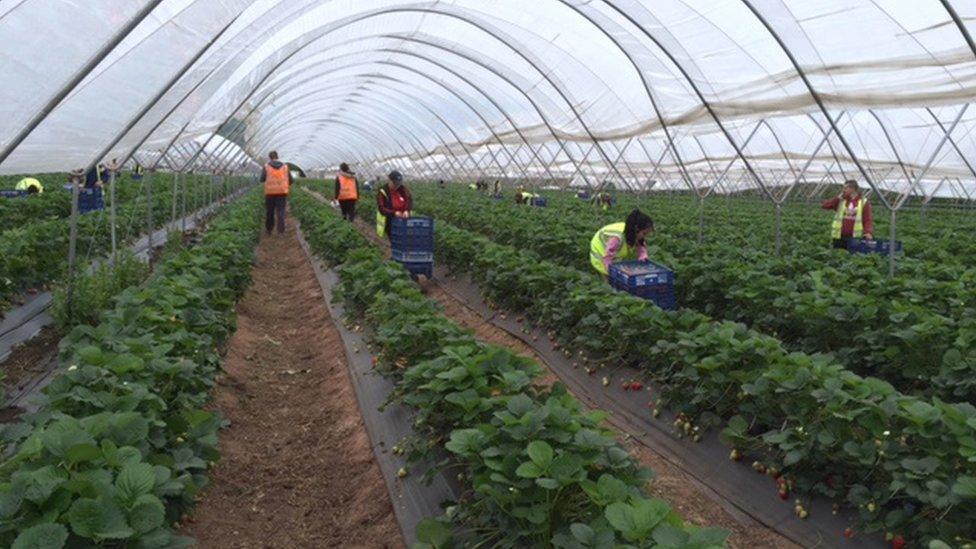EU referendum: Farmers split on the future
- Published
The BBC's David Shukman examines how farmers feel about the EU referendum
Behind the quiet tapestry of farmland stretching across the UK is a turbulent debate over Britain's membership of the European Union.
At first sight, with billions in subsidies, you might think that every farmer would automatically want to keep the cash flowing and therefore choose to stay in.
But it's not so simple.
In 2014, the most recent year with confirmed figures, UK farms received £3.19bn. The average payment was £17,735. The highest was almost £2m.
For many farmers, particularly those working marginal land such as hills with poor soil, the subsidies act as a lifeline.
Mark Williams runs a farm perched on steep slopes near Welshpool in Wales with a spectacular view over the Severn Valley.
Sitting on his quad bike, a flock of sheep grazing nearby, he describes the payments as essential to keep communities like his going.
He says hill farming is very difficult and that the margins on beef and sheep alone are very tight, "so the subsidy is very important to protect those farms".

But travel the short distance from the Welsh uplands to the rich soils of Shropshire near Telford and you hear a very different story.
Bruce Udale and his daughter Isabel Moseley, who grow animal feed on their 1,200 acres, are both determined to leave the EU.
This is farming on an industrial scale, with huge fields and impressive machinery. We watch a giant tractor extend two vast arms to spray a bright green crop of wheat.
The farm attracts tens of thousands of pounds in CAP payments, but Bruce and Isabel are convinced that British farmers would be better off without them.
In their view, the subsidies swirling through the agricultural economy artificially inflate prices which means - according to Bruce - that the payments are not worth as much as they sound.
"If we don't have subsidies", he says, "I believe our costs would come down. Land values would probably come down, rents would certainly come down, machinery costs would come down because a lot of these things are priced at what the market thinks we've got in our pockets.
"So the loss would not be as great as many people think."
And, because the payments come from the EU via the UK government, there is notorious bureaucracy. Isabel says it's hugely time-consuming and she resents it.
"For our children's future we should take things back in hand, make our own rules and regulations in Great Britain for our benefit.
"Now we have Brussels making our decisions. Yes, we have a slight input, but we can't change anyone's minds."
Export debate
On his hill farm, Mark Williams has an answer to that.
"If they think there's going to be any less regulation, the UK is not going to revoke sheep tagging, they're not going to revoke the licences, they're not going to revoke the burial of livestock.
"We're still going to have to put up with all of that."
What about access to markets? Of the UK's agricultural exports, just over 63% went to the EU with about 36% going to the rest of the world.
Mark says that makes the EU a crucial outlet.
"Over 90% of British beef and lamb ends up in the EU. With such a high number, to mess about with that could have big consequences."
But Bruce Udale argues that if the UK did withdraw, trade with Europe would not be over.
"With everything except sheep, we import more than we export, so I don't have too many worries that the EU would want to do a reasonable deal with us."
Another hot topic is labour. About 24,000 farm workers have come from the rest of the EU and at harvest-time the most labour-intensive farms - cultivating fruit and veg - require far more.

There are no exact numbers but some estimates suggest that around 60,000, mainly East Europeans, come for the summer.
Hidden behind tall hedgerows near Ross-on-Wye in Herefordshire is Eric Drummond's fruit farm, where as many as 350 Bulgarians and Romanians work at breakneck speed, picking strawberries in huge plastic polytunnels.
Without EU membership, he fears that the supply would simply dry up and paralyse production.
"It's a huge risk to your business, to any horticultural business. The whole industry relies on this labour coming into the country. So we are personally in favour of staying in because there's no word on what happens if we come out."
Shaping the landscape
But like every point in this debate, there's a counter-argument.
Bruce Udale says there could be a scheme, similar to one that operated in recent years, where foreign workers could be brought in for a temporary period.
"I say tick them in, know where they're going, tick them out when they've finished. We can't have them just coming and going."
Farmers themselves are probably too small in number to make much of a difference in the vote, but their sector of the economy is hugely important.
Not only does the Common Agricultural Policy (CAP) command the largest share of the EU budget, but also the farms themselves provide much of the food we eat.
And how that work is carried out, and how it's organised, shapes the landscape itself.
- Published30 December 2020

